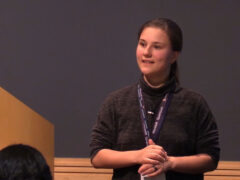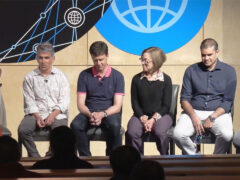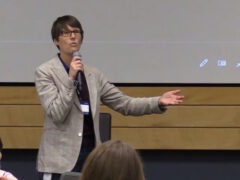VERSE: Voice. Exploration. Retrieval. Search.
People with visual impairments are expert users of audio interfaces, including voice-activated virtual assistants and screen readers. Through interviews and surveys of this population, we learned that virtual assistants are convenient and accessible, but lack the ability to deeply engage with content (for example, to read beyond the first sentence of a Wikipedia article), and the ability to present a quick overview of the information landscape (for example, to list other search results and search verticals). In contrast, traditional screen readers are powerful and allow for deeper engagement with content (when content is accessible), but at the cost of increased complexity and decreased walk-up-and-use convenience. Our prototype, VERSE (Voice Exploration, Retrieval, and SEarch), combines the positive aspects of virtual assistants and screen readers to better support free-form, voice-based web search. As with screen readers, VERSE addresses the need to provide shortcuts and accelerators for common actions. Specifically, VERSE allows users to perform gestures on a companion device such as a phone or smart watch. These companion devices are not strictly necessary, but help overcome the long activation phrases that can become tedious when repeated to smart speakers.
- Date:
- Haut-parleurs:
- Adam Fourney
- Affiliation:
- Microsoft Research
-
-

Adam Fourney
Principal Researcher
-
-
Taille: Microsoft Research Faculty Summit
-
-
Quantum Computing and Workforce, Curriculum, and Application Development: Case study
Speakers:- Krysta M. Svore,
- Martin Roetteler
-
-
-
-
Crowd, Cloud and the Future of Work: Updates from human AI computation
Speakers:- Besmira Nushi,
- Vani Mandava
-
-
-
-
-
Empowering People to Achieve More: How Useful a Concept is Productivity?
Speakers:- Brendan Murphy
-
-
Productivity in Software Development
Speakers:- Neel Sundaresan,
- Margaret-Anne Storey,
- Prem Kumar Devanbu
-
-
-
-
-
-
-
Accessible Virtual Reality
Speakers:- Eyal Ofek
-
Calendar.help: A Virtual Meeting Scheduling Assistant
Speakers:- Pamela Bhattacharya
-
Visual Studio IntelliCode
Speakers:- Mark Wilson-Thomas
-
Microsoft Teams: Collaborate with Any Researcher Anywhere
Speakers:- Jethro Seghers
-
Project Alava: Programming Webs of Microcontrollers
Speakers:- James Devine,
- Teddy Seyed
-
AI in PowerPoint
Speakers:- Kostas Seleskerov

























